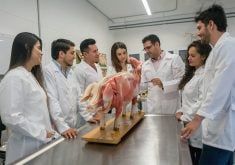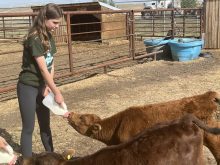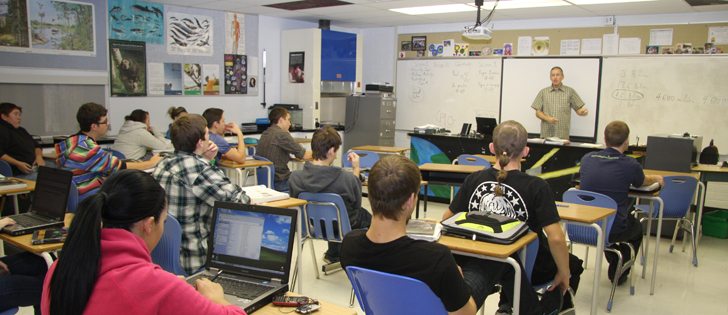MORINVILLE, Alta. — Most of the students in the urban agriculture program at Morinville Community High School know urban, but few know anything about agriculture.
Teacher Neil Korotash knows the Grade 10 and 11 students in his urban agriculture class likely won’t turn into farmers after taking a semester-long course on food and agriculture, but he hopes they may gain an appreciation for food.
For Erika Courterille, the field trips to local dairy, hog, chicken, beef, grain farms, orchards and greenhouses were the first time she had been to a farm.
“I didn’t know it took so much work. It is crazy. They work 24-7 just to maintain it,” she said.
One of the highlights for Courterille was learning how to butcher a pig and turning it into bacon, ham and chops and rendering the fat into lard for pies.
“I now have more interest in food,” she said.
It was through Korotash’s own interest in wanting to know more about food that the course was developed.
“I’m a city boy. I don’t know anything about farming.”
A student hearing about Korotash’s weekend food courses wondered why students couldn’t learn about food production in school.
After three semesters, the course keeps evolving as Korotash learns more about food, farmers and agriculture.
“I’m learning along with the children. I didn’t know what a combine did until a year ago.”
Read Also

AgCanadaTV: Your Agriculture News Recap for Oct. 17, 2025
https://youtu.be/GevFlt7b2-U U.S. bill could keep out Canadian truck drivers A bill tabled in the U.S. house of representatives this month would keep…
Morinville retains its strong rural ties. Within minutes, Korotash’s students can be on the school bus and bouncing along backroads to talk to farmers willing to share their knowledge and talk about their farm.
The course content changes each semester to coincide with the farming season. In the fall, as students came back to school, they picked fruit and vegetables and learned to make jams, jellies and pickles.
During harvest, they travelled to conventional and organic grain farms to ride a combine and learn about grain harvest.
Back in the classroom, they turned flour from the farms into bread, pasta and pie.
“We want kids to see it right from the farm and how to get it to the table,” he said.
Jean-Luc Coupal said while he had visited friends on acreages and farms, the urban agriculture class was the first time he had done any “farm related” activities.
“It’s so cool, from simple eggs and flour, you can make a multitude of different things,” he said.
As part of this semester’s class, students grew herbs in boxes under different lights where they compared the best lights for growing plants indoors. They used the herbs from their herb boxes to flavour their pork sausage and chicken noodle soup.
Sheryl Nielsen said most of what she learned in class about agriculture was new to her.
“I learned about indoor growing with hydroponics. It’s so easy to do year round. It’s really sustainable,” said Nielsen, who grew nasturtiums, marigolds and lavender in her earth box.
Before taking the course, Alyssa Ralph had never been to a farm.
“I liked the pig farm. That was really cool. I never knew how animals were raised. That was really educational,” she said, while cutting the massive basil plants grown in hydroponics under lights.
The basil is sold at a local grocery store.
“I’d like to try growing my own herbs because there is quite a bit of taste difference.”
Natasha Kryger said she signed up for the optional course because it intrigued her.
“It was a way for me to learn where the food comes from. Before this, I hadn’t considered growing herbs in hydroponics. We got to use grain to make our own bread.”
The urban agriculture course was not Mitchel Bachand’s first choice when picking his classes.
“I didn’t want to be in this course at all,” said Bachand, who was finishing writing a report on the herb boxes.
But over the semester, he has gained a grudging interest in food production.
“Butchering, killing, making food. Who doesn’t like food?” he said.
Sarah Watts said since she has taken the course, she and her mother have taken an interest in growing herbs, flowers and beautifying their yard.
“My mom and me want to start a garden after the snow goes.”
The field trips and cooking classes in the commercial kitchen next to the school were also a highlight for Watts.
“The pig butchering was kind of gross, but kind of awesome at the same time.”
Since learning how to cut up a chicken, Watts said they now save money at the grocery store.
“If my mom wants to buy some chicken, I can cut up the chicken now. We didn’t know how to do anything before.”
Korotash said the students aren’t expected to memorize recipes or meat charts, but hopes they gain a greater interest in the food system, gain new skills and think about sustainability in food and agriculture.
“I hope they develop an appreciation for our food system and gain some skills and recognize they can do it,” he said.
“This stuff will stick in your brain.”
Contact mary.macarthur@producer.com















